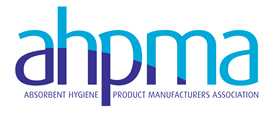Representing the UK disposable nappy, adult continence care and period product industries


AHPMA and EDANA statement on inaccurate reports about disposable nappies
22 July 2022
AHPMA, EDANA and their members, who produce the majority of all disposable nappies sold in the UK and EU, are very concerned at a series of misleading reports that contain highly inaccurate claims about nappies. These claims are unfounded and alarmist and are likely to cause unnecessary stress and worry to the millions of families who use our products every day. We are pleased to see that many of these reports have been taken down.
These reports suggest that “90% of babies have been exposed to highly toxic nappies” and that infants face “potentially very severe diseases in later life”. This is false.
We firmly dispute these claims and we believe that disposable nappies remain safe for families to use. The safety of our products is an absolute priority for our industry.
Manufacturers ensure that all products comply with all relevant European and national legislation relating to chemicals and product safety and are safe for their intended and foreseeable use. Our members have launched a Stewardship Programme for Absorbent Hygiene Products* which goes beyond EU legal obligations to ensure the maximum level of safety of and transparency on our products.
These misleading claims are based on a highly selective use of data published over the years by French authorities and that have been reported out of context. The same French authority reported in 2020 that diapers were safe – https://www.edana.org/about-us/news/edana-welcomes-reconfirmation-of-diaper-safety-by-french-authorities
In response to concerns raised by the French authorities in 2019, the European Chemicals Agency (ECHA) was asked to review whether the presence of certain chemicals in disposable nappies could pose a threat to human health. Following a very thorough investigation, ECHA concluded that a risk could not be demonstrated and pointed out uncertainties and shortcomings in the analytical method used for testing, stating that “the reliability of the analytical results is likely to be severely affected” by these uncertainties.
While there were trace levels of some contaminants in some products, they were not enough to pose a risk. To refer to “highly toxic nappies” and a risk of “very severe diseases later in life” is there deeply irresponsible.
Such contaminants are not intentionally added to nappies nor are they used in the manufacturing processes. They are found in the external environment including in many foodstuffs and they do not present any health risk. For example, formaldehyde is found in higher trace levels in organic materials such as fruit (where the level is 200 times higher than in nappies) or milk (where the level is 10 times higher).
About AHPMA
The absorbent Hygiene Products Manufacturers Association (AHPMA) is the trade association
representing the UK disposable nappy, absorbent continence care and feminine hygiene products
Industries. Members include brand owners, manufacturers and distributors who supply the UK market.
About EDANA
EDANA helps its members to design their future, serving more than 300 companies in the nonwovens and related industries, across over 30 countries. Its mission is to create the foundation for sustainable growth of the nonwovens and related industries through active promotion, education and dialogue.
For further information, please contact:
UK and Ireland enquiries:
Tracy Stewart,
Director General, AHPMA
Telephone: 01483 962984
E-mail: stewart.t@ahpma.co.uk
Website: www.ahpma.co.uk
Enquiries outside of the UK and Ireland:
Gil Stevens,
External Relations & Sustainability Director, EDANA
Telephone: +32 2 740 18 25
E-mail: gil.stevens@edana.org
Website: www.edana.org
Simon Taylor,
Media Relations, Rud Pedersen Public Affairs
Telephone: +32 496 697773
E-mail: simon.taylor@rudpedersen.com